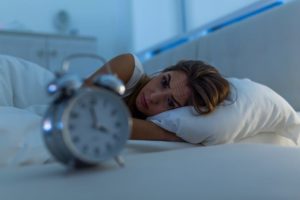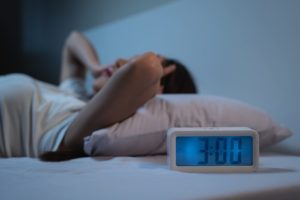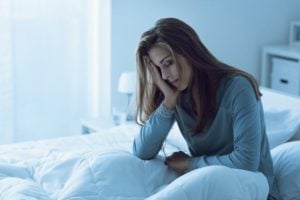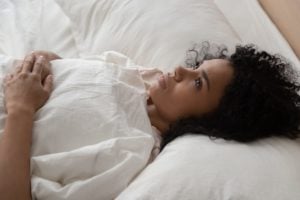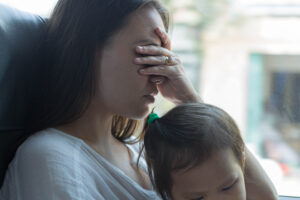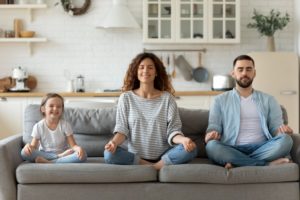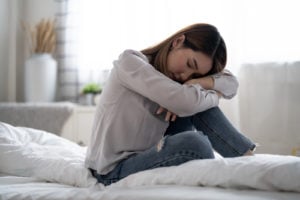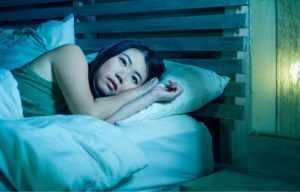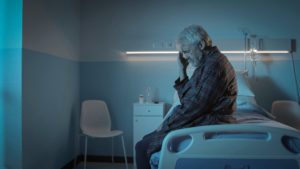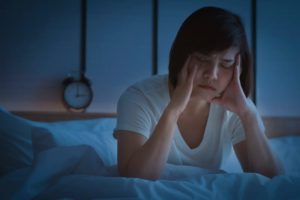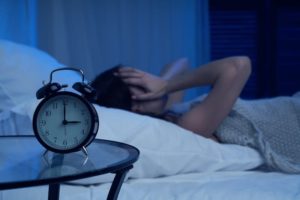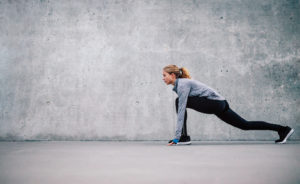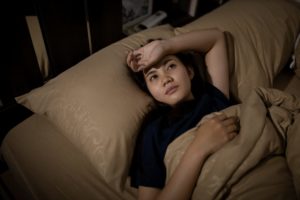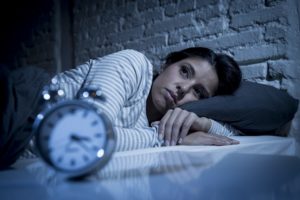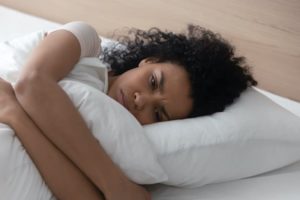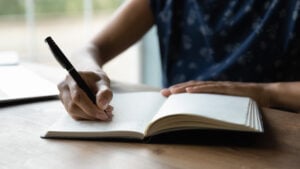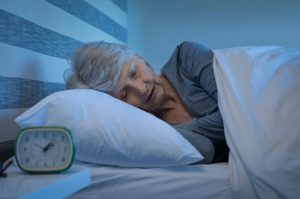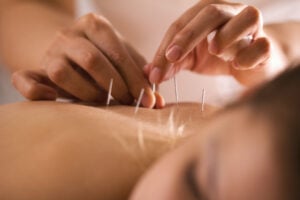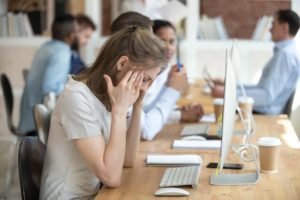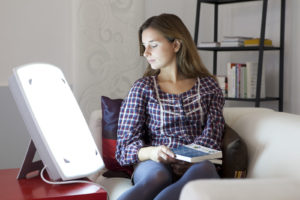Natural Cures for Insomnia: From Acupressure to Yoga
Table of Contents
- What Causes Insomnia?
- What Is a Natural Cure for Insomnia?
- What Lifestyle Changes Can You Make to Improve Insomnia?
- Cognitive Behavioral Therapy for Insomnia (CBT-I)
- Relaxation Techniques for Insomnia
- Yoga and Exercise for Insomnia
- Changing Your Diet for Insomnia
- Holistic Methods for Insomnia
- Natural Sleep Aids
- Insomnia is a common sleep disorder involving an inability to fall asleep or stay asleep.
- Many people with insomnia symptoms look for alternatives to sleeping pills, including natural sleep aids.
- Making lifestyle changes and improving sleep hygiene can often help improve sleep.
- Cognitive behavioral therapy for insomnia (CBT-I) is a well-established treatment focused on reframing negative thoughts about sleep and enhancing sleep habits.
- Studies about other natural treatments are limited, but some evidence suggests that yoga, tai chi, exercise, and relaxation techniques can support better sleep.
- Some foods, dietary supplements, and herbal remedies have been associated with improved sleep, but more research is needed to understand their benefits and drawbacks.
- You should always talk with a doctor before trying a natural sleep aid to avoid unwanted side effects or interactions with other medications you take.
Insomnia is when you have enough time to sleep but struggle to fall asleep or stay asleep for as long as you want . In the short term, insomnia can cause daytime drowsiness, impair your thinking, and worsen your mood. Long-term insomnia can contribute to other health problems, including the risk of cardiovascular disease .
Most people experience insomnia at times. As many as 15% of people live with insomnia on a regular basis.
Although medications exist to treat insomnia, many people are interested in options to improve their sleep without sleeping pills . According to surveys, millions of Americans use alternative treatments for insomnia.
However, not all alternative treatments are effective, and some may even pose health risks. The majority of these treatments have not been well studied, leaving many open questions about their benefits and side effects.
We take a closer look at different proposed natural cures for insomnia and explain what you need to know about them and how they could affect your sleep and overall health.
What Causes Insomnia?
Insomnia is often a short-term problem linked to stress, including from personal or professional challenges. With short-term insomnia, sleep often bounces back to normal once stress levels go down.
In other cases, insomnia is a chronic, long-term problem, affecting sleep on multiple nights per week for over three months. Chronic insomnia is frequently linked to other health issues, such as depression, anxiety, alcohol or substance use, breathing disorders, or cardiovascular disease . It can also be tied to other sleep disorders, like sleep apnea, which involves disrupted breathing during sleep.
The exact cause of insomnia is not always identifiable, and it is possible for short-term insomnia to develop into chronic insomnia .
What Is a Natural Cure for Insomnia?
There’s no standard definition for a natural cure for insomnia, but for many people, a natural approach is one that does not involve any pharmaceutical drugs, such as prescription sleeping pills.
Insomnia treatment can involve many therapies that are not sleeping pills. In fact, many doctors and sleep experts prefer to first try other approaches before prescribing medications .
For some people, making lifestyle changes and improving sleep habits can make it easier to sleep well . Those changes can also be incorporated into a well-established treatment called cognitive behavioral therapy for insomnia (CBT-I).
Some other natural approaches that have been proposed as natural treatments for insomnia include yoga, holistic methods like mindfulness, dietary changes, supplements, and herbal remedies. However, the definition of natural can be controversial since, for example, some supplements are made synthetically .
Overall, most experts conclude that there is too little data to be able to recommend for or against the use of these natural approaches for insomnia. Before trying an insomnia treatment, it’s best to talk with a doctor to better understand its benefits and risks.
What Lifestyle Changes Can You Make to Improve Insomnia?
A number of lifestyle changes can pave the way to better sleep.
One key habit for healthy sleep is budgeting enough time for sleep every day . For some people, daytime sleepiness isn’t actually due to insomnia but rather the result of not giving themselves enough time for sleep.
If you have time to sleep but still find it difficult to initially fall asleep or stay asleep through the night, building up your sleep hygiene may bring relief. Sleep hygiene refers to both your daily habits and your sleep environment.
Examples of ways to strengthen your sleep hygiene include:
- Keeping a regular sleep schedule that minimizes variation in your nightly bedtime and morning wake-up time
- Maintaining your sleep schedule every day, including weekends and holidays
- Making your bedroom conducive to sleep by ensuring that it is quiet, dark, and cool
- Establishing a pre-bed routine that helps you wind down
- Limiting screen time for an hour or more before bedtime
- Reducing or eliminating alcohol consumption in the evening
- Cutting out coffee or other caffeinated drinks in the afternoon and evening
- Eating dinner earlier and limiting snacking and heavy foods before bed
- Making time for physical activity or exercise every day
- Getting exposure to natural light, ideally in the early part of the day
- Avoiding extended naps in the late afternoon and evening
Beyond sleep hygiene, other lifestyle changes may be helpful in treating insomnia. For example, relieving stress may help resolve short-term insomnia symptoms. In addition, if insomnia is being caused by another health problem or medication, addressing that issue may enhance sleep.
Cognitive Behavioral Therapy for Insomnia (CBT-I)
Cognitive behavioral therapy for insomnia (CBT-I) is the most rigorously studied and widely recommended treatment for insomnia that does not involve sleeping pills .
CBT-I is a type of therapy that is usually performed with the help of a therapist or counselor, although there are some app-based programs for CBT-I . A core part of CBT-I is trying to counteract worries and other negative thoughts about sleep. This is often paired with relaxation techniques and sleep hygiene improvements to facilitate more consistent and higher-quality sleep.
CBT-I is safe and can be adapted to meet individual needs. Research has found that it can help most people with insomnia, and sleep experts frequently recommend CBT-I as the first treatment for insomnia symptoms.
Relaxation Techniques for Insomnia
Because stress can disrupt sleep, relaxation techniques can be used as a natural remedy for insomnia. Most relaxation techniques are safe, and some research indicates that they can contribute to better sleep.
There are many types of relaxation methods, including guided imagery, progressive muscle relaxation, and controlled breathing techniques. These relaxation strategies may be included in other insomnia treatment programs, such as CBT-I.
Guided hypnotherapy is another relaxation technique that has shown benefits for insomnia in some small studies. Experts emphasize that hypnotherapy should only be done with the oversight of a licensed professional.
Listening to relaxing music is another approach that has shown a potentially positive effect on sleep. With this approach, music should be set to a low volume and should avoid sounds that could be distressing or otherwise disruptive to sleep.
Yoga and Exercise for Insomnia
Evidence suggests that regular exercise can make it easier to fall asleep and stay asleep , but it may not fully resolve insomnia. Limited research has looked at specific types of exercise, such as yoga and tai chi, and has found that they may offer modest sleep benefits.
A number of studies have shown that practicing yoga may enhance sleep, including in people with specific sleep challenges, such as cancer patients and women living with menopause symptoms.
That said, the evidence is mixed since not all research has shown yoga to promote better sleep. Yoga should also be performed with caution to prevent injury.
Tai chi may offer similar benefits, but more research is needed to understand how it and other types of exercise compare in terms of their effect on sleep and insomnia.
Changing Your Diet for Insomnia
Nutrition can affect sleep, but there is no clearly established type of food or diet that can be considered a natural cure for insomnia .
Some research has found that diets with lots of processed foods and drinks and few fruits and vegetables are associated with poor sleep . In small studies, nutrition from balanced diets, such as the Mediterranean diet and the Dietary Approaches to Stop Hypertension (DASH) diet, was linked with potential benefits for sleep.
There is also evidence that eating certain foods in the hours before bed may help reduce the symptoms of insomnia. For example, multiple studies have found that kiwi , including dried kiwi , may promote sounder sleep.
Tart cherries and tart cherry juice may also be sleep-promoting. Tart cherries have high levels of melatonin, a natural hormone involved in sleep. Certain nuts, tomatoes, and strawberries are also known to have high levels of melatonin.
However, because most foods include multiple nutrients, we rarely consume nutrients in isolation. This makes it hard to pinpoint the impact of any one specific nutrient on sleep.
The timing of our meals and snacks may also play a role in how diet influences sleep. These issues make it challenging to identify specific dietary cures for addressing insomnia.
Holistic Methods for Insomnia
Holistic methods, such as mindfulness meditation, acupuncture, acupressure, and aromatherapy, have not been thoroughly investigated as treatments for insomnia. While some studies suggest that they could improve sleep, evidence to date is far from conclusive.
Mindfulness meditation is a practice intended to help develop a non-judgmental awareness of the present moment to foster a sense of calmness and ease. Though there are some indications that mindfulness can support better sleep, sleep experts say that there’s not enough evidence to make a recommendation for or against it.
Acupuncture comes from traditional Chinese medicine and involves the careful placement of thin needles into specific areas of the body to try to ameliorate health conditions . Few high-quality studies have been conducted to evaluate acupuncture for sleep. However, one type of acupuncture around the ear has shown positive signs as a treatment for insomnia symptoms. Acupuncture is considered safe when performed by a trained professional.
Acupressure is similar to acupuncture but places physical pressure on the skin instead of inserting needles . In early-stage studies, acupressure has shown mixed results for improving sleep.
Another holistic approach is to use plant-derived essential oils for aromatherapy. Though more studies are needed, some evidence indicates that aromatherapy can help people with insomnia. The main potential side effects from aromatherapy include allergies and skin reactions.
Natural Sleep Aids
Many different types of products are marketed as natural sleep aids. These can include herbal remedies, amino acids, vitamins, and minerals. Many of these products are sold as dietary supplements, and they may be plant-based or synthetic.
While botanical and herbal formulations have been used for thousands of years , their impact on sleep has not been fully evaluated in research studies. As a result, their effectiveness as a natural therapy for insomnia is not well established.
Melatonin is a hormone that is naturally produced by the body that helps regulate the sleep-wake cycle . Synthetic melatonin is commonly sold as a sleep aid. According to sleep experts, melatonin has a stronger track record as a treatment for jet lag than insomnia.
Melatonin is believed to be safe for use over short periods, but there is limited data about the side effects of long-term use. In addition, studies have found that the actual dosage of many melatonin supplements does not correspond to the dosage shown on the label.
Beyond melatonin, many other compounds are often marketed as natural sleep aids although evidence to support their effectiveness is limited. Examples include:
- Magnesium
- Vitamin D
- Chamomile
- L-theanine
- Cannabidiol (CBD) and tetrahydrocannabinol (THC)
- Glycine
- Adaptogens like ginseng and ashwagandha
- Valerian root
- Kava
None of these sleep aids has been rigorously studied, but there is anecdotal data and reports from small studies about their ability to promote sleepiness.
Most of these sleep aids are thought to be generally safe, but there are specific concerns with valerian root and kava. Both have been linked to potentially serious side effects involving the liver.
You should talk with a doctor or pharmacist before taking any sleep aid. They can provide information about dosage and possible interactions with other medications you take . You should also be cautious about using sleep aids if you are pregnant or breastfeeding.

Still have questions? Ask our community!
Join our Sleep Care Community — a trusted hub of product specialists, sleep health professionals, and people just like you. Whether you’re searching for the perfect mattress or need expert sleep advice, we’ve got you covered. Get personalized guidance from the experts who know sleep best.
References
24 Sources
-
Martin, J. L. (2023, December 6). Patient education: Insomnia (Beyond the Basics). Benca, R. (Ed.). UpToDate.
https://www.uptodate.com/contents/insomnia-beyond-the-basics -
National Heart, Lung, and Blood Institute. (2022, March 24). Insomnia – What is insomnia?
https://www.nhlbi.nih.gov/health/insomnia -
Zhao FY, Xu P, Kennedy GA, Conduit R, Zhang WJ, Wang YM, Fu QQ, Zheng Z. Identifying complementary and alternative medicine recommendations for insomnia treatment and care: a systematic review and critical assessment of comprehensive clinical practice guidelines. Front Public Health. 2023 Jun 15;11:1157419. doi: 10.3389/fpubh.2023.1157419. PMID: 37397764; PMCID: PMC10308125.
https://pubmed.ncbi.nlm.nih.gov/37397764/ -
MedlinePlus: National Library of Medicine (US). (2024, September 13). Insomnia.
https://medlineplus.gov/insomnia.html -
American Academy of Sleep Medicine. (2014). The International Classification of Sleep Disorders – Third Edition (ICSD-3). Darien, IL.
https://aasm.org -
Martin, J. L., & Neubauer, D. N. (2024, October 17). Patient education: Insomnia treatments (Beyond the basics). In R. Benca (Ed.). UpToDate.
https://www.uptodate.com/contents/insomnia-treatments-beyond-the-basics -
National Heart, Lung, and Blood Institute. (2022, March 24). Insomnia – Treatment.
https://www.nhlbi.nih.gov/health/insomnia/treatment -
Neubauer, D. (2024, November 12). Pharmacotherapy for insomnia in adults. UpToDate
https://www.uptodate.com/contents/pharmacotherapy-for-insomnia-in-adults -
National Center for Complementary and Integrative Health. (2024, May). Sleep Disorders and Complementary Health Approaches.
https://www.nccih.nih.gov/health/sleep-disorders-and-complementary-health-approaches -
Blume C, Garbazza C, Spitschan M. Effects of light on human circadian rhythms, sleep and mood. Somnologie (Berl). 2019 Sep;23(3):147-156.
https://pubmed.ncbi.nlm.nih.gov/31534436/ -
National Center for Complementary and Integrative Health. (2024, March). Psychological and Physical Approaches for Sleep Disorders: What the Science Says.
https://www.nccih.nih.gov/health/providers/digest/psychological-and-physical-approaches-for-sleep-disorders-science -
Eigl ES, Hauser T, Topalidis PI, Schabus M. On the Efficacy of a CBT-I-Based Online Program for Sleep Problems: A Randomized Controlled Trial. Clocks Sleep. 2023 Oct 9;5(4):590-603.
https://pubmed.ncbi.nlm.nih.gov/37873840/ -
McPhillips MV, Petrovsky DV, Lorenz R, Lee J, George T, Smyth A, Bubu OM, Brewster GS. Treatment Modalities for Insomnia in Adults Aged 55 and Older: A Systematic Review of Literature from 2018 to 2023. Curr Sleep Med Rep. 2024 Jun;10(2):232-256.
https://pubmed.ncbi.nlm.nih.gov/39156226/ -
Zuraikat FM, Wood RA, Barragán R, St-Onge MP. Sleep and Diet: Mounting Evidence of a Cyclical Relationship. Annu Rev Nutr. 2021 Oct 11;41:309-332.
https://pubmed.ncbi.nlm.nih.gov/34348025/ -
Jansen EC, Stern D, Monge A, O’Brien LM, Lajous M, Peterson KE, López-Ridaura R. Healthier dietary patterns are associated with better sleep quality among midlife Mexican women. J Clin Sleep Med. 2020 Aug 15;16(8):1321-1330.
https://pubmed.ncbi.nlm.nih.gov/32329434/ -
Lin HH, Tsai PS, Fang SC, Liu JF. Effect of kiwifruit consumption on sleep quality in adults with sleep problems. Asia Pac J Clin Nutr. 2011;20(2):169-74.
https://pubmed.ncbi.nlm.nih.gov/21669584/ -
Kanon AP, Giezenaar C, Roy NC, McNabb WC, Henare SJ. Acute effects of fresh versus dried Hayward green kiwifruit on sleep quality, mood, and sleep-related urinary metabolites in healthy young men with good and poor sleep quality. Front Nutr. 2023 Mar 14;10:1079609.
https://pubmed.ncbi.nlm.nih.gov/36998905/ -
Losso JN, Finley JW, Karki N, Liu AG, Prudente A, Tipton R, Yu Y, Greenway FL. Pilot Study of the Tart Cherry Juice for the Treatment of Insomnia and Investigation of Mechanisms. Am J Ther. 2018 Mar/Apr;25(2):e194-e201.
https://pubmed.ncbi.nlm.nih.gov/28901958/ -
National Center for Complementary and Integrative Health. (2022, October) Acupuncture: Effectiveness and Safety.
https://www.nccih.nih.gov/health/acupuncture-effectiveness-and-safety -
A.D.A.M. Medical Encyclopedia. (2023, July 8). Nausea and acupressure. MedlinePlus.
https://medlineplus.gov/ency/article/002117.htm -
U.S. Department of Veterans Affairs. (2024, May 1). Botanical Medicines to Support Healthy Sleep and Rest. Whole Health Library.
https://www.va.gov/WHOLEHEALTHLIBRARY/tools/botanical-medicines-healthy-sleep-rest.asp -
The National Center for Complementary and Integrative Health. (2024, May). Melatonin: What You Need To Know.
https://www.nccih.nih.gov/health/melatonin-what-you-need-to-know -
Rao TP, Ozeki M, Juneja LR. In Search of a Safe Natural Sleep Aid. J Am Coll Nutr. 2015;34(5):436-47.
https://pubmed.ncbi.nlm.nih.gov/25759004/ -
National Center for Complementary and Integrative Health. (2020, February). Dietary and Herbal Supplements.
https://www.nccih.nih.gov/health/dietary-and-herbal-supplements


